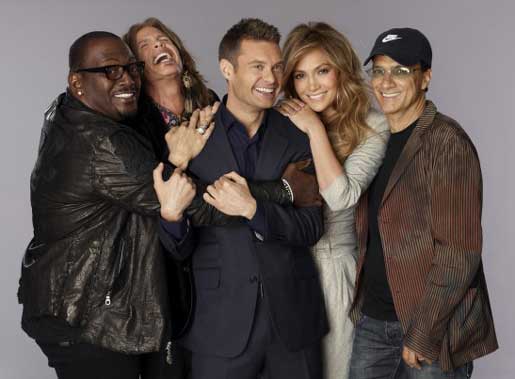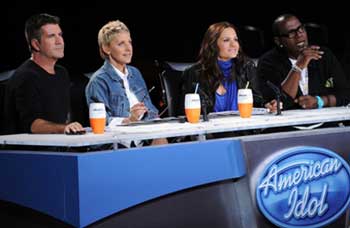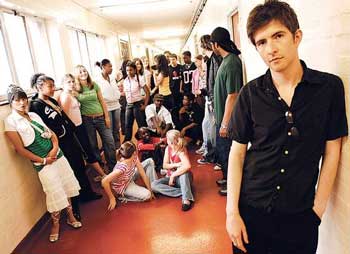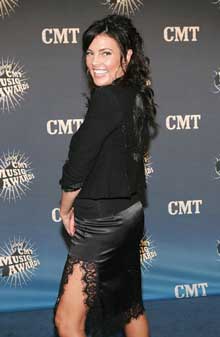 The summer's worst-kept secrets were confirmed Wednesday: Long-time Aerosmith front-man and legendary party guy Steven Tyler and entertainment goddess Jennifer Lopez will replace Simon Cowell, Kara DioGuardi and Ellen DeGeneres next season at the American Idoljudges' table.
The summer's worst-kept secrets were confirmed Wednesday: Long-time Aerosmith front-man and legendary party guy Steven Tyler and entertainment goddess Jennifer Lopez will replace Simon Cowell, Kara DioGuardi and Ellen DeGeneres next season at the American Idoljudges' table.
The much-ballyhooed live online presentation of this "huge" news proved to be an epic fail: There was no audio for the first few minutes on americanidol.com and ustream.tv, the two sites carrying the live reveals on stage at The Forum in Los Angeles. An unintentional cone of silence fell over Tyler's entire appearance and much of Lopez's time with host Ryan Seacrest. The audio popped in just as Lopez declared that she wanted to find "the next Michael Jackson," which had me wondering if she had ever seen the show. Right now, it seems to me that Idol is so far removed from what it once was that it will be lucky to find the next Prince Poppycock!

To give credit where it's due, the Idol team is reverting to the three-judge format after two seasons of reckless self-destruction. But gosh, what's with the addition of two superstars to a franchise that has never been about stargazing? Giant celebrities have never fit comfortably in the Idol mold; in fact, their presence goes against everything that made this show an instant (and unexpected) phenomenon right from its start back in the summer of 2002. The public has embraced Idol because it is all about discovering talent on the stage and empowering viewers at home. It is not about the "stars" at the judges table.
Consider these observations: With the exception last season of response to Harry Connick Jr., I have never heard anyone rave about the contributions of any celebrity mentors or performers on this show. They come, they go, they sometimes give bad advice to the eager young wannabes, and then they are forgotten. Moreover, the decision back in Season 3 to rotate celebrity judges throughout the competition proved unfortunate, as few understood it and none was invested in its outcome. The arrival of Ellen DeGeneres and the addition of numerous celebrity judges to the Season 9 audition process (which yielded the least-talented group of finalists in the show's history) proved to be breaking points.
The selection of Steven Tyler truly baffles me. I have no idea what he will bring to the show that is in line with the proven preferences of its audience, which has never actively embraced kinetic entertainers (except for Adam Lambert). The gentler, quieter, classier Jennifer Lopez might have an easier time fitting in. I believe she will be the first judge who is also a parent. She will certainly be the first mom on deck, so I would expect she might bring a nurturing quality to the show.

I don't know if they are available or would have even wanted the gig. But if I ruled American Idol, my dream duo would have been British television personality Gareth Malone, the well-informed, multi-talented star of the BBC reality competition/observational documentary hybrid series The Choir (seen here Wednesday at 10 p.m. ET on BBC America), and music industry executive Anastasia Brown, the best and brightest and smartest judge on USA's late and much-missed Nashville Star.
Malone trains kids and teenagers to sing in classical music groups at schools or in communities that generally do not offer music programs for young people. He knows music. He's used to working with kids (most of them younger than the average Idol contestant) and he is especially good with those who have lots of talent but no real experience at performing. He has a strong presence on camera. He can be quite charming at times but can also be devastatingly direct, sometimes reducing his pupils to tears with his criticism. Also, since he always begins each arc of the show with more novice singers than will fit in a final choral group, Malone is no stranger to the difficulties of painful weekly eliminations.

The tough-talking and unwaveringly direct Brown actually became known as the "female Simon Cowell" during her three years on Nashville. She was always entertaining to watch and interesting to listen to, crisply and efficiently weeding out the weakest performers without batting an eyelash. Brown understands how challenging and unforgiving the music and entertainment industries can be, and she was never afraid to play the bad guy when other judges on the show (and there were several) were determined to be nice.
Like most of the regulars we have come to know on Idol, Malone and Brown are largely unknown to viewers. That's a good thing. Remember, when this show debuted in '02, few people had ever heard of judges Simon Cowell and Randy Jackson or co-hosts Ryan Seacrest and the long-forgotten Brian Dunkleman. (Paula Abdul had been a big star -- way back in the '80s!) Like many of its contestants Idol made them stars, too. That's the way the audience likes it!